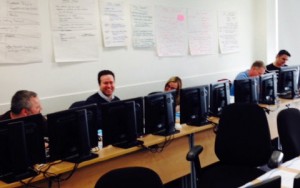I am one of six people who were recently selected for the first ever DWP Junior WebOps training program. The program was specifically created for DWP by external IT training provider QA Training with input from the DWP WebOps team. It runs for 12 weeks and covers a wide range of topics and skill areas that are essential to creating and maintaining user-centred digital services at DWP.
The six of us are a mix of ages and backgrounds. Everyone on the program has come from a different part of DWP but we all have a common interest in WebOps and all share a desire to learn.
What is WebOps?
WebOps was initially described to me by colleagues as “the dark arts” that keep the wheels turning at DWP Technology. A few weeks into the training program, I’d sum up WebOps as the deployment, operation, maintenance, tuning and repair of web-based services.
This means that once a service has been developed and delivered into the live environment by our product teams, it’s up to WebOps to keep it functioning as designed.
The Junior WebOps Program
As we develop new digital products and services at DWP, so the WebOps team needs to grow to support them. The Junior WebOps training program is one way of meeting that need by developing skilled staff in house (we’re also recruiting for experienced WebOps professionals right now).
The program is divided into three blocks – I’ve just completed the first block.
The learning experience
The first day was like attending a new school. Getting up at 5.30am to get to Leeds for 9am wasn’t pleasant, but I was eager (and a bit nervous) for the massive journey that lay ahead.
I’d had a telephone call with the others on the program the week before starting, but it was still exciting getting to know each other on that first day, and embarking on a 12-week journey together into the unknown.
The first week focused on agile and lean. These are methods of working and thinking that are now well embedded at DWP when it comes to building digital services. Being from an ITIL & PRINCE2 background, it was extremely interesting and new to me, but I definitely saw the value in it and we started applying some of the agile principles immediately (more on that later).
By the end of Week 1 we had formed a great team (Lego and an impromptu evening out with the WebOps team and apprentices might have played a part!) and were set for the rest of Block 1.
Core WebOps Technologies
The next few weeks focused on the core technologies used in WebOps.
First up was Linux in Week 2 – a whole new operating system for most of us. The course was excellent, although even with a technical background I found it intense and challenging at times. We were told before we started that this program wasn’t going to be easy and that it would require serious commitment – Week 2 really brought this home.
Week 3 began with a couple of revision days – some time to gather thoughts and collate what had been learnt to date – and finished with some structured networking with experienced WebOps colleagues and staff from other teams.
This turned out to be the calm before the storm. Week 4 ramped up the intensity even further as we took on the LAMP stack (Linux, Apache, MySQL and PHP) – the backbone of the WebOps world.
We had got the basics of working with Linux down in Week 2 so it was good to break those skills out again, but it was still an incredibly challenging few days learning two new software packages and a programming language.
Incorporating agile
One of the best things about the program is that we weren’t just learning abstract concepts - we started using the things we were learning immediately, particularly when it came to agile.
Once we’d got the basic agile learning down, we began each day with a stand-up meeting where we could discuss any issues we’d had the day before and agree what we would do that day. Not only did the stand-ups help us get to know each other better, they were also a chance to help each other out with anything we were struggling with and ensure everyone was progressing evenly – really useful given our different backgrounds and knowledge levels.
Each week also finished with a retrospective where we advised both the WebOps team and the external training provider on our experiences of the course – what went well, what didn’t and any recommendations for improvements. This is important to the program as we are the first iteration and our feedback will help improve and shape the next version of the course.
My personal retrospective on Block 1 is that it has been tough but enjoyable, if you like to learn! I can’t wait to get stuck into the next Block.


5 comments
Comment by David Durant posted on
It would be interesting to know the syllabus for this course. The cornerstone of webOps these days are infrastructure automation tools like Puppet and Chef. Are they covered?
Comment by Nic.Fry posted on
Hi David,
Sorry for the delay responding, Mark does not have access to DOI while on the training and I am responding on Mark`s behalf.
We are covering the syllabus for the Junior WebOps training course on a blog-by-blog basis - the second piece in this series, looking at web programming and version control, is now up on the blog (https://dwpdigital.blog.gov.uk/2015/07/03/putting-the-web-in-webops/)
However, I can confirm that Puppet is the DWP WebOps automation tool of choice and that our WebOps trainees will be getting to grips with Puppet in Block 3 of the course – look out for a blog on that in the few weeks.
Details on the rest of the course-
W/C 06/07/2015 VM Ware Sphere 5.5 configuration,
W/C 13/07/2015 Consolidation/ Leave week,
W/C 20/07/2015 Amazon Web Services – Systems Operations on AWS,
W/C 27/07/2015 Web/Devops Tooling
Thanks
Nic Fry DWP IT Services Digital Communications
Comment by Kat posted on
We did look at Puppet, but not enough time for Chef as well!
Comment by Andy Lewis posted on
If you aren't contributing to the development of the services that are "being delivered into the live environment by the product team", you aren't really doing Web Ops. What you are doing is system administration, albeit a bit more "webby" than the old days.
Web Ops means being involved in the build from Day 1. Is it going to scale? What are the challenges going to be with clustering the data? Does the product team understand your architecture? What is the caching strategy?
Comment by Nic.Fry posted on
Thank you for your email Andy, you are correct web operations cover a broad spectrum of activities involving the deployment, operation, maintenance, tuning, and repair of web-based applications and systems.
The blog written by Mark covered the training activities undertaken by our trainees, now the training has finished they are consolidating their learning alongside live projects developing and deploying live services.